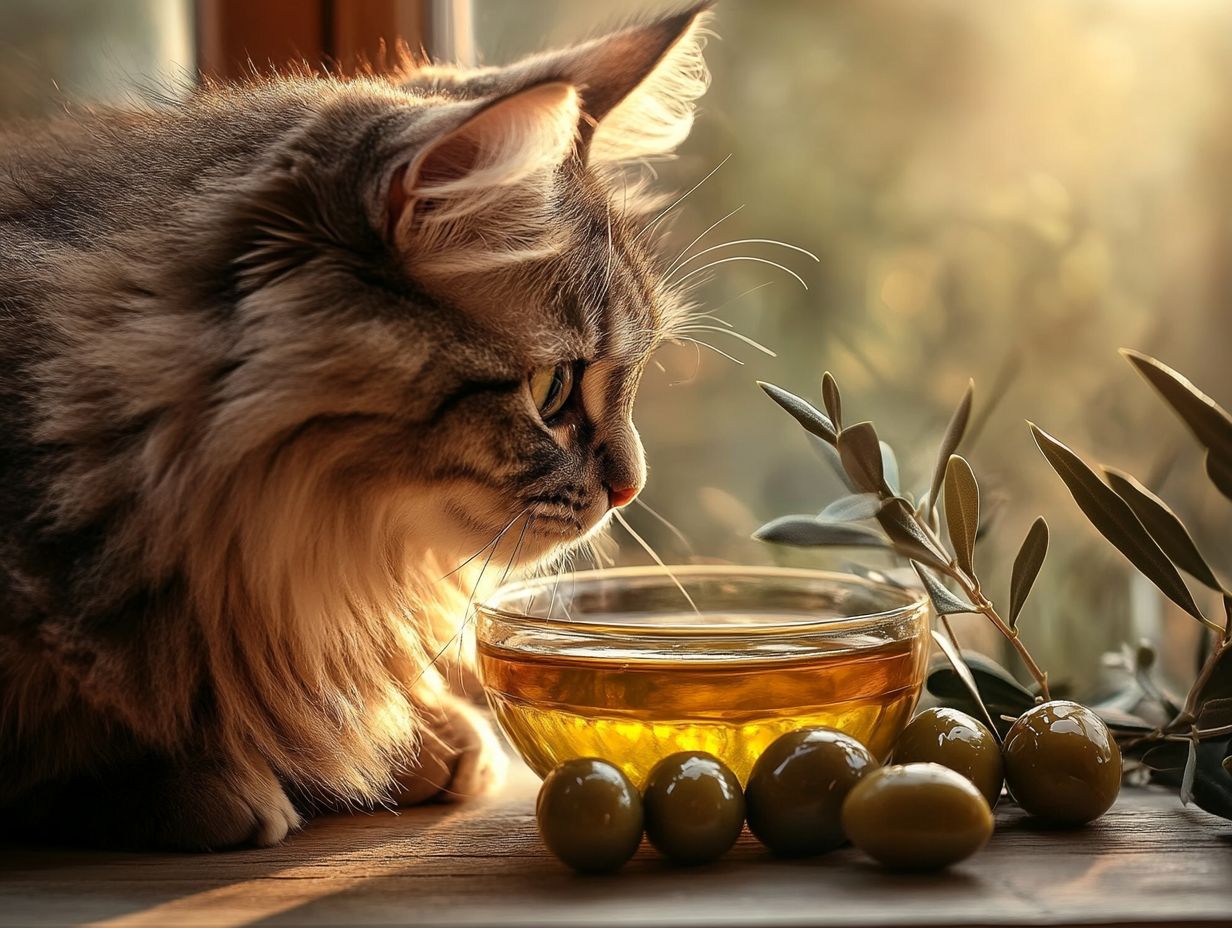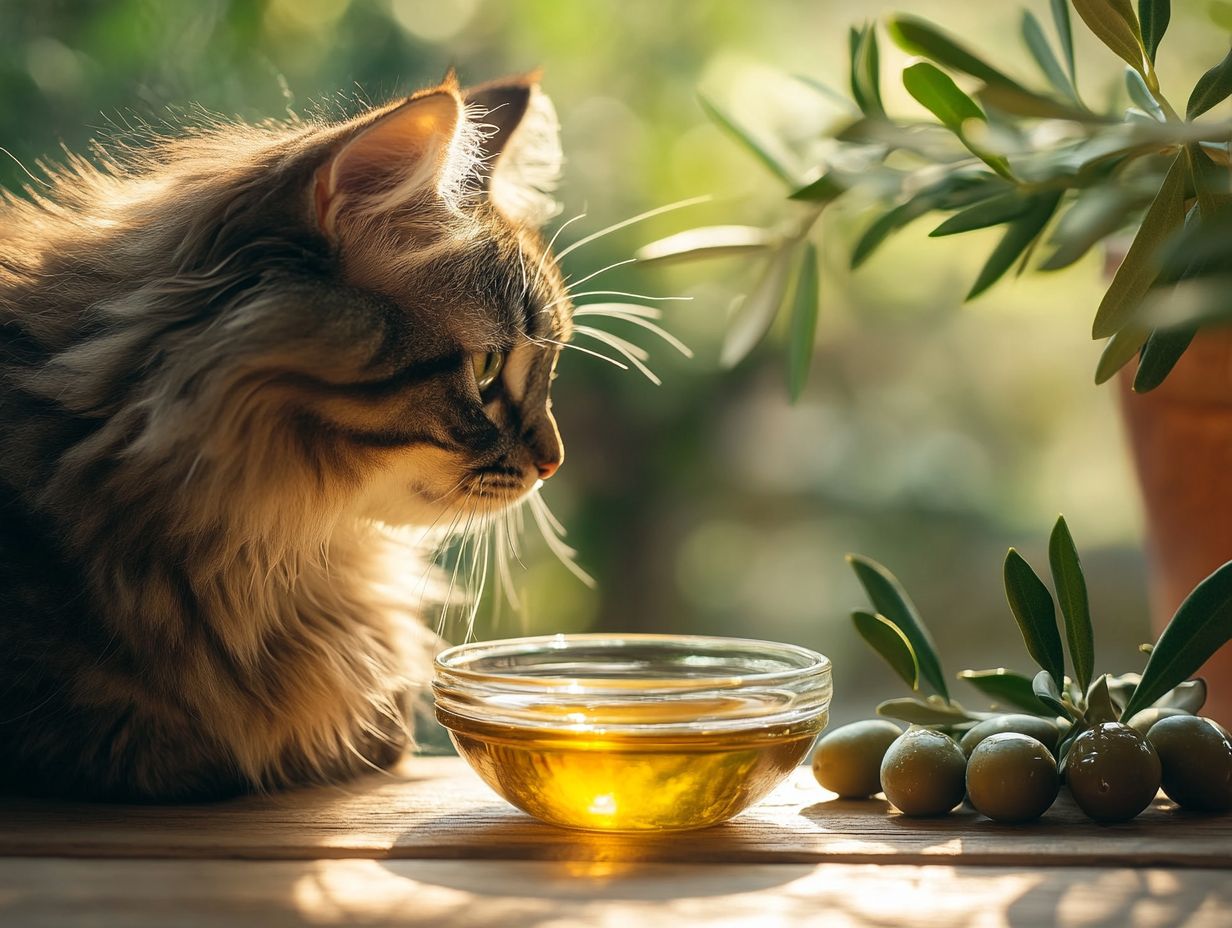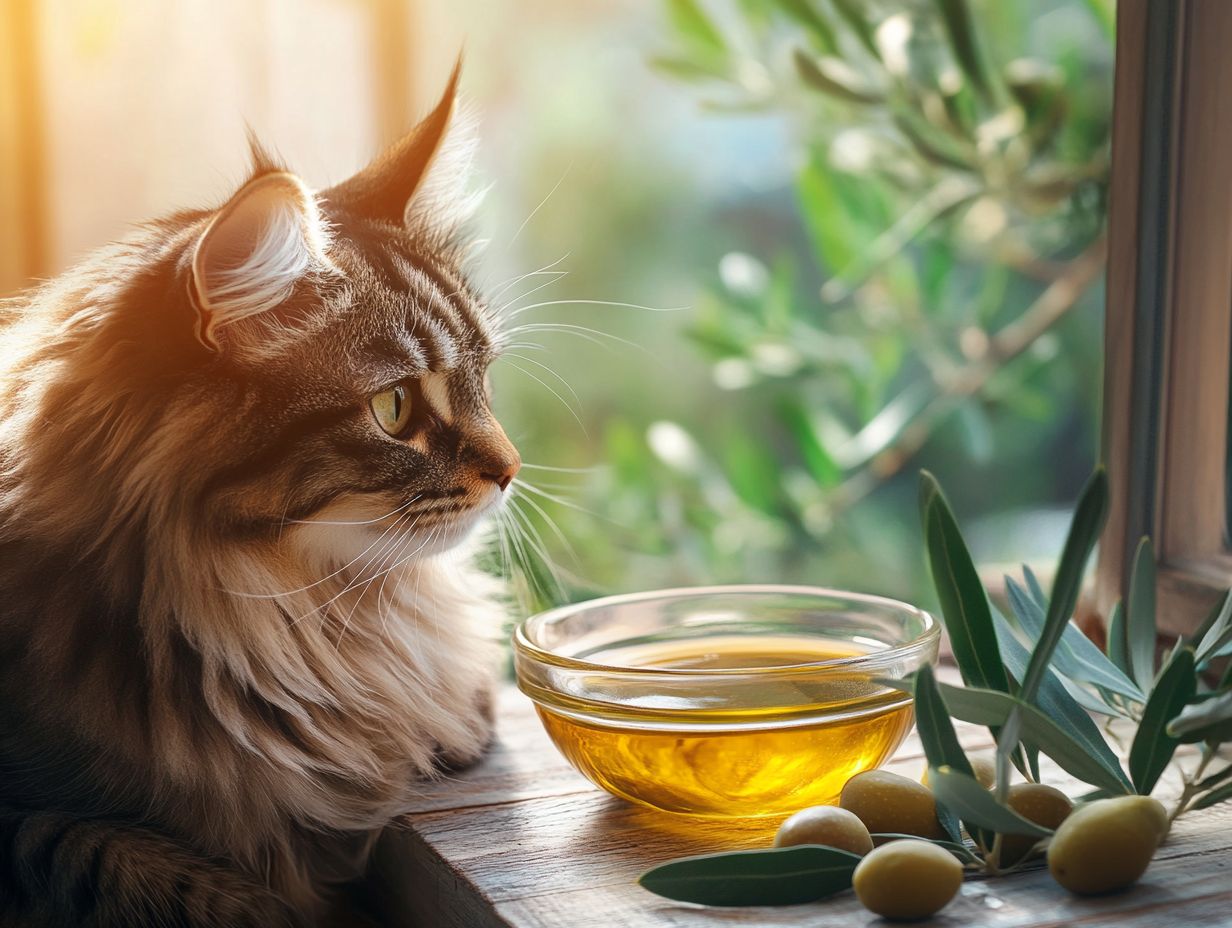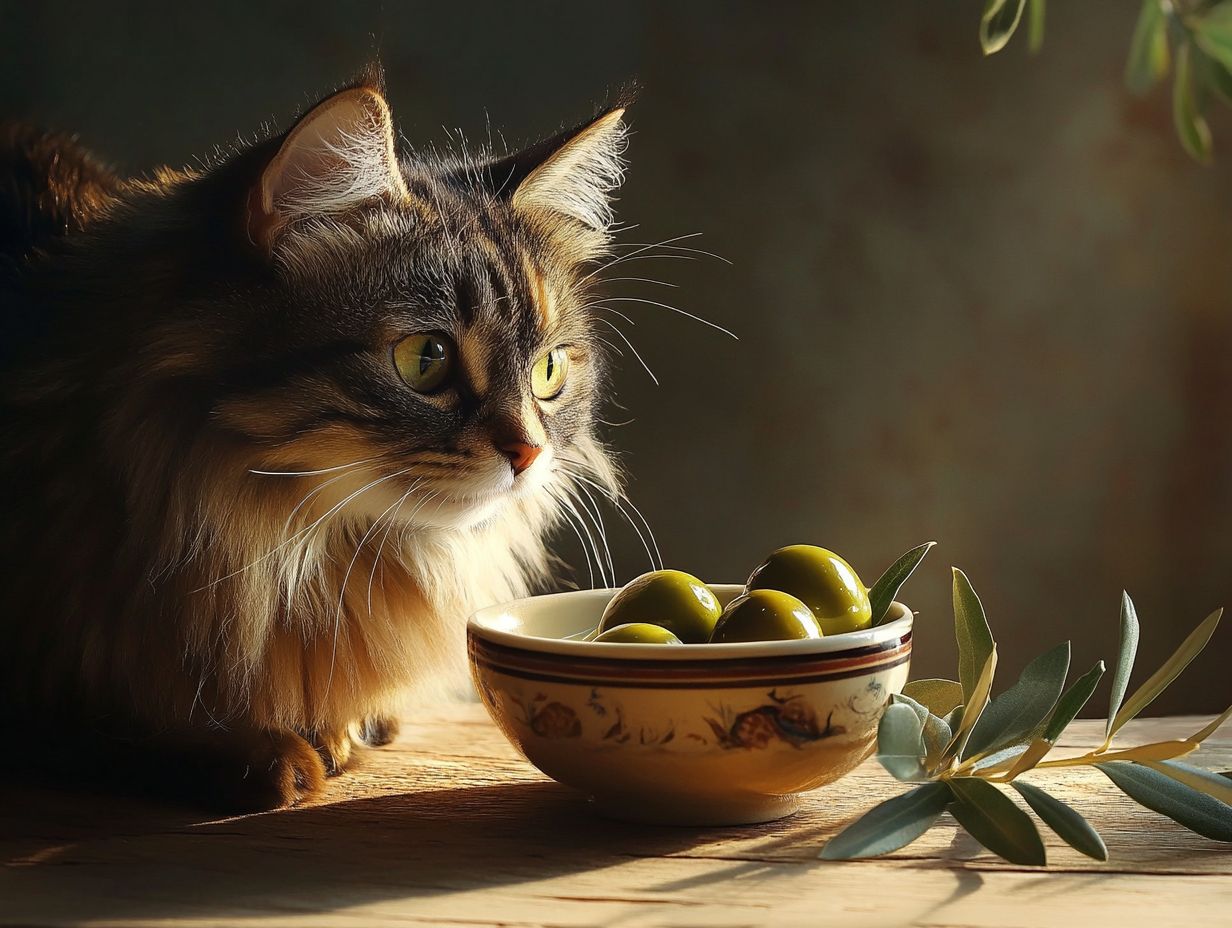Wondering if olive oil is safe for your cat? This article discusses its potential benefits, risks, and safe ways to incorporate it into your pet’s diet.
This article explores the positives, like its ability to enhance coat and skin health, treat dry skin, and support digestion. It also discusses the possible risks and how to introduce it into your cat’s diet safely, considering veterinary advice.
Additionally, some nutritious alternatives will be highlighted, such as fish oil and flaxseed oil. Read on to discover if olive oil could be a great addition to your cat’s menu!
Key Takeaways:

- Olive oil can improve a cat’s coat and skin health due to its high levels of healthy fats and antioxidants.
- Incorporating a small amount of olive oil into a cat’s diet can support digestive health and help with hairball issues.
- While olive oil can provide health benefits for cats, it is important to consult with a veterinarian and only use it in moderation to avoid potential risks like obesity and other side effects.
Why the Interest in Olive Oil for Cats?
The inclusion of olive oil in cats’ diets is a growing trend among pet owners, driven by its health benefits and nutritional value. Olive oil mainly contains healthy fats and vitamins E and K, which support feline health.
Pet owners have discovered that olive oil can help cats acquire healthy fats, combat obesity, and reduce joint inflammation. The anti-inflammatory properties of olive oil may alleviate arthritis symptoms in older cats, while its antioxidants help protect cells from damage. Additionally, it can aid in managing ear mites and other gastrointestinal issues.
As our understanding of nutrition evolves, pet owners are increasingly interested in diets that promote longevity and vitality in their cats.
Key Health Benefits of Olive Oil for Cats
Olive oil is recognized for its potential health benefits, including support for cardiovascular health and maintaining healthy LDL cholesterol levels. It may also boost the immune system and promote longevity.
Rich in healthy fats, olive oil supports the overall immune system and may promote an anti-inflammatory response in felines.
Moreover, vitamins E and K found in olive oil play a significant role in maintaining good health, ensuring that cats receive a balanced diet that fulfills their nutritional requirements.
Improving Coat and Skin Health
Olive oil is recognized for its beneficial effects on cats’ coats and skin, helping to treat dry skin and reduce matting. The nutritional composition of extra virgin olive oil, which contains vitamin E, promotes a shiny, healthy coat.
To safely incorporate olive oil into your cat’s diet, start with 1/4 teaspoon per meal and monitor your cat’s reaction. Limit olive oil to no more than 1 teaspoon per day for an average adult cat.
Experts frequently recommend it as a natural treatment for these conditions, and veterinarians have observed positive changes in fur texture and appearance in several cats after incorporating it into their diets. One pet owner shared that her cat’s previously matted fur became silky and easier to brush, highlighting the oil’s effectiveness in reducing tangles and addressing dry skin.
Additionally, the antioxidants in olive oil contribute to skin health by providing nourishment, protecting against harmful environmental factors, and reducing inflammation.
Supporting Digestive Health
While olive oil can provide health benefits, it is crucial to be aware of potential risks, such as obesity and digestive upset if fed in excess. Always consult a veterinarian before making dietary changes.
When considering alternatives, options like fish oil and flaxseed oil also offer their own benefits, such as omega-3 fatty acids, which can further support your cat’s health.
Conclusion
In moderation, olive oil can be a beneficial addition to your cat’s diet, but always consult your veterinarian first for personalized advice.

Benefits of Olive Oil for Cats
If you’re considering adding olive oil to your cat’s diet, here are some essential tips! Olive oil plays a significant role in supporting cats’ digestive health by regulating bowel movements and reducing the occurrence of hairballs. It also provides benefits for their skin. Although the fat in olive oil can’t replace the natural fats in a cat’s diet, it can promote a healthy digestive system and help relieve some gastrointestinal discomfort. Furthermore, it assists in managing digestive issues and enhances calories intake.
Improved digestion is likely to enhance the overall quality of life for cats. Studies have shown that the healthy fats in olive oil can soften stool, making it easier for cats to pass waste, which is especially beneficial for those with irregular bowel movements.
Experts note that the lubricating effect of the oil may aid in hairball management by helping ingested hair move more smoothly through the digestive tract.
Potential Risks of Feeding Olive Oil to Cats
While olive oil offers many benefits, pet owners should also be aware of the potential risks of feeding it to cats, especially in excess. Overconsumption may lead to health risks such as feline obesity, which can worsen weight-related health issues.
Some cats may develop allergies or intolerances to olive oil. Signs of an allergic reaction can include:
- Vomiting
- Diarrhea
- Itching or skin irritations
For these reasons, it’s essential to exercise caution when considering olive oil as part of their diet.
Side Effects and Possible Health Concerns
Be aware that olive oil can have side effects for cats. While it has positive benefits for humans, the differences in fat metabolism between cats and humans make moderation essential.
- Watch for signs of digestive distress, such as diarrhea or vomiting.
- Consult a veterinarian before introducing olive oil into your cat’s diet.
How to Safely Incorporate Olive Oil into a Cat’s Diet
Olive oil can be safely included in a cat’s diet when following recommended dosages and proper incorporation methods. It’s crucial to consult your veterinarian for specific advice regarding the appropriate dosage tailored to your cat’s unique dietary needs.
Using proper incorporation methods is vital for maintaining the overall safety and balance of your cat’s diet.
Recommended Dosage and Methods

The dosage of olive oil for cats depends on their size and health. For smaller cats, it is advisable to start with a quarter teaspoon. Medium-sized cats may require a half teaspoon, while larger cats can have up to a full teaspoon.
| Cat Size | Recommended Dosage |
|---|---|
| Small Cats | 1/4 teaspoon |
| Medium Cats | 1/2 teaspoon |
| Large Cats | 1 teaspoon |
Olive oil can be mixed with their cat food or offered as a special treat. Some cats might enjoy having olive oil drizzled over their food, as the scent can entice even the pickiest eaters. After introducing olive oil, monitor your cat’s behavior and health closely. Remember, moderation is key, as too much fat in a cat’s diet can lead to obesity and other health issues.
Alternatives to Olive Oil for Cats
If you’re looking for healthy alternatives, consider options like fish oil, flaxseed oil, or coconut oil. These provide necessary dietary fats without the potential downsides associated with olive oil.
Conclusion
To summarize, olive oil can offer health benefits for cats, but it must be used with caution. Always consult your veterinarian before making any dietary changes to ensure it’s suitable for your cat’s health. Your cat’s well-being is the priority!
Understanding dietary alternatives is crucial for cat health, as excessive dietary fat can lead to common health issues such as obesity, diabetes, and pancreatitis. Specific alternatives in commercial diets or natural sources can help ensure a balanced intake of all essential nutrients for cats while also considering their individual health needs. Understanding these alternatives enables pet owners to make more informed decisions about their cats’ diets, potentially reducing the risk of health problems related to excessive dietary fat and total fat intake.
Other Nutritious Foods for Cats
The best alternatives to olive oil for cats, which provide essential dietary fats and omega fatty acids critical for their well-being, include fish oil, flaxseed oil, and various other nutrient-dense ingredients. These options can be incorporated into both commercial diets and homemade meals. Exploring these alternatives can lead to benefits such as improved coat condition, enhanced brain function, and better joint health.
Benefits
Fish oil is particularly beneficial as it provides omega-3 fatty acids necessary for maintaining healthy skin and fur, promoting both coat health and shine. Research indicates that omega-3s also possess anti-inflammatory properties, making them useful for older cats or those with medical conditions that require anti-inflammatory support. They may help alleviate the severity of conditions such as arthritis and reduce issues such as ear mites and digestive system complications. A study found that omega-3 fatty acids can promote cognitive function in aging cats, underscoring their importance for feline health.
Flaxseed oil serves as a plant-based alternative to fish oil and is a good source of both omega-3 and omega-6 fatty acids, which are important for cardiovascular health. It can also enhance the overall quality of a cat’s coat.
Safe Feeding Guidelines
Pet owners can safely and easily incorporate these oils into their cat’s meals by mixing a specific quantity into kibble or adding them to homemade treats. For fish oil, it is generally recommended to give 1/4 teaspoon for every 10 pounds of body weight, similar to the guidelines for olive oil. Flaxseed oil can be introduced in similar amounts, starting with 1/4 teaspoon and monitoring for any adverse reactions.
Frequently Asked Questions
Can cats eat olive oil?

Yes, cats can safely consume small amounts of olive oil as part of a balanced diet. It is recommended to give your cat 1/4 teaspoon of olive oil for every 10 pounds of body weight to avoid digestive upset.
What are the health benefits of olive oil for cats?
Olive oil contains healthy fats and antioxidants that can support your cat’s immune system and promote a shiny coat.
How much olive oil can I give my cat?
It is recommended to only give your cat a small amount of olive oil (1/4 teaspoon for every 10 pounds of body weight) to avoid digestive upset.
Can olive oil help with hairballs in cats?
Yes, the lubricating properties of olive oil can help prevent hairballs in cats by aiding in the passage of hair through their digestive system.
How should I give olive oil to my cat?
Olive oil can be added to your cat’s food or given directly by placing a small amount on their paw for them to lick off.
Are there any risks to giving cats olive oil?
While olive oil is generally safe for cats, giving them too much can lead to weight gain and digestive issues. It is also important to avoid flavored oils or any oils that contain garlic or onion, as these can be toxic to cats.
Warnings
Excessive oil intake can lead to gastrointestinal upset, diarrhea, and obesity. Always consult with your veterinarian before introducing new oils into your cat’s diet, especially if they have pre-existing health conditions.
In conclusion, incorporating oils such as olive, fish, and flaxseed into your cat’s diet can offer numerous health benefits. However, moderation is key, and it is vital to consult your veterinarian when making dietary changes to ensure your cat’s well-being.